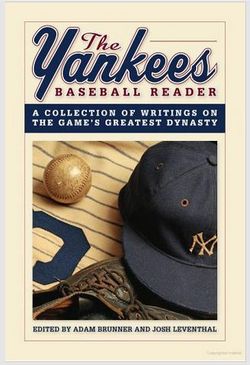The Yankees Baseball Reader: A Collection of Writings on the Game's Greatest Dynasty - Adam Brunner, Josh Leventhal - MVP Books, Apr 15, 2011 - Sports & Recreation - 352 pages

In the opener of the August 30 sweep of Washington, Slow Joe Doyle (named for the time he took between pitches) hurled his second straight shutout—the only two games he won all year. In the nightcap, Chase clouted
three triples and a double to turn an 8-1 deficit in the sixth inning into a 9-8, 10-inning triumph. Then, on September 3, with 20,000 fans on hand to see New York taking on Philadelphia, Elberfeld showed why he was called the Tabasco
Kid. Furious that an Athletics runner had been called safe at third on a close play, Elberfeld began chasing umpire Silk O'Loughlin around the field. To the astonishment of the shortstop, his own fans—bored with his regular eruptions
and impatient to get on with the important game—started booing him. The mood turned so ugly that the police had to be dispatched to escort Elberfeld off the field. Philadelphia, however, drew the wrong moral from the incident: When some of its players began another lengthy argument in the second game, the fans had even less patience with them. Connie Mack finally called them off the field, and the contest was awarded to the Highlanders by forfeit.
-------------------------------------------------------------------
Chase himself told Baseball Magazine in 1917 that the main cause of his doldrums at the end of the year was an injury. But perhaps even more telling than that defense—or the hindsight pile-on that has characterized much of the writing about the Californian—was the perspective offered by Elberfeld in a 1942 interview with J. G. Taylor Spink of The Sporting News. Elberfeld, who never had any love for Chase even before the lapse of 36 years, blamed the first baseman for one thing—what he called "not having enough fight" But he was dumped into the same category as Keeler, whose crime was supposedly whistling in the outfield during the most tense moments of games, and every other player on the roster except himself, third baseman Wid Conroy, and second baseman Jimmy Williams. "We just didn't have many fighters on the club:' the shortstop told Spink. "I mean players who fought for everything the way the old Orioles used to fight." Moreover, according to the Tabasco Kid, the team didn't catch many breaks toward the end of the year. "In all my experience in baseball I don't remember another week in which so many things went wrong on a club as happened to us when we were losing steadily:' he said. "Grounders were taking bad hops, poor hitters were hitting balls they never hit before, we were misjudging flies, running into each other, until the club was almost off its head."
three triples and a double to turn an 8-1 deficit in the sixth inning into a 9-8, 10-inning triumph. Then, on September 3, with 20,000 fans on hand to see New York taking on Philadelphia, Elberfeld showed why he was called the Tabasco
Kid. Furious that an Athletics runner had been called safe at third on a close play, Elberfeld began chasing umpire Silk O'Loughlin around the field. To the astonishment of the shortstop, his own fans—bored with his regular eruptions
and impatient to get on with the important game—started booing him. The mood turned so ugly that the police had to be dispatched to escort Elberfeld off the field. Philadelphia, however, drew the wrong moral from the incident: When some of its players began another lengthy argument in the second game, the fans had even less patience with them. Connie Mack finally called them off the field, and the contest was awarded to the Highlanders by forfeit.
-------------------------------------------------------------------
Chase himself told Baseball Magazine in 1917 that the main cause of his doldrums at the end of the year was an injury. But perhaps even more telling than that defense—or the hindsight pile-on that has characterized much of the writing about the Californian—was the perspective offered by Elberfeld in a 1942 interview with J. G. Taylor Spink of The Sporting News. Elberfeld, who never had any love for Chase even before the lapse of 36 years, blamed the first baseman for one thing—what he called "not having enough fight" But he was dumped into the same category as Keeler, whose crime was supposedly whistling in the outfield during the most tense moments of games, and every other player on the roster except himself, third baseman Wid Conroy, and second baseman Jimmy Williams. "We just didn't have many fighters on the club:' the shortstop told Spink. "I mean players who fought for everything the way the old Orioles used to fight." Moreover, according to the Tabasco Kid, the team didn't catch many breaks toward the end of the year. "In all my experience in baseball I don't remember another week in which so many things went wrong on a club as happened to us when we were losing steadily:' he said. "Grounders were taking bad hops, poor hitters were hitting balls they never hit before, we were misjudging flies, running into each other, until the club was almost off its head."



